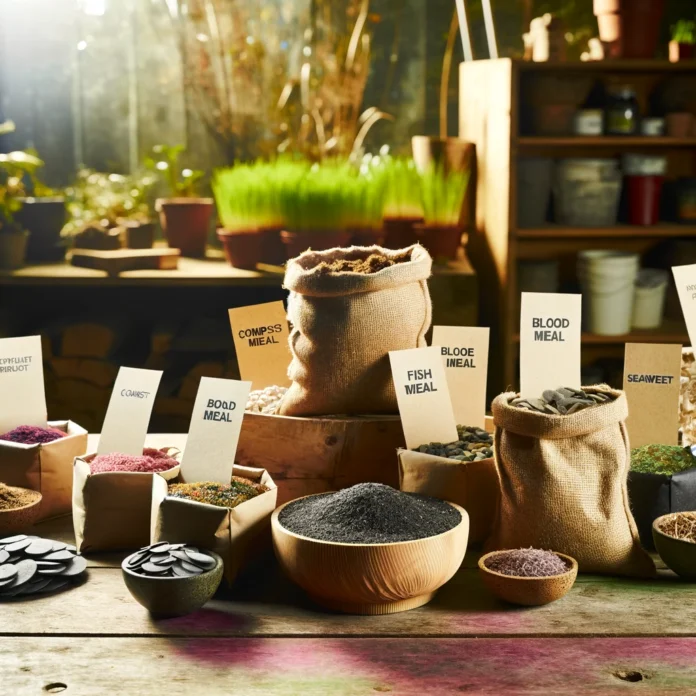Hey, green thumbs and garden enthusiasts! Are you trying to give your plants the royal treatment they deserve without using harsh chemicals? Look no further! This is all about feeding your garden with the best organic plant food. We’re diving deep into organic fertilizers, from homemade concoctions to top-shelf products, ensuring your garden survives and thrives. Buckle up for a journey through nutrient-rich soils, where we’ll uncover the secrets to a lush, vibrant garden the natural way.
What Makes it Organic?
In contrast to its chemical counterparts, organic plant food comes from natural sources like compost, animal manure, and plant residues. It’s about returning to basics, using materials Mother Nature provides to nourish your plants. This section delves into the composition of organic fertilizers and why they’re a win-win for your garden and the environment.
Why Go Organic?
Choosing organic plant food isn’t just a trendy gardening fad; it’s a commitment to sustainable and eco-friendly practices. This part explores the benefits of going organic, from improving soil structure to promoting biodiversity. We’ll also debunk common myths, ensuring you’re armed with the facts to make informed decisions for your green space.
The Best Organic Fertilizers: A Closer Look
Homemade Wonders
Why buy when you can DIY? Creating your organic plant food can be rewarding and cost-effective. This section includes recipes for compost, worm castings, and liquid fertilizers you can whip up with kitchen scraps and yard waste. We’ll walk you through step-by-step processes, ensuring your garden gets a gourmet meal, homemade with love.
Top Commercial Picks
Sometimes, the convenience of store-bought organic fertilizers must be maintained. We’ve sifted through many products to bring you reviews of the best options available. Discover which products will make your garden flourish without breaking the bank or compromising quality, from pelletized manures to liquid seaweed.
Applying Organic Plant Food: Timing and Techniques
When to Feed Your Plants
Timing is everything when it comes to fertilizing your garden. This part guides you through the seasons, explaining when and why to feed your plants for optimal growth. Whether it’s a spring boost or a pre-winter prep, we have the timing tips to keep your garden glowing year-round.
How to Apply for Best Results
Sprinkle, pour, or mix? The method of application can significantly affect the effectiveness of your organic fertilizer. Here, we outline the best practices for applying different types of organic plant food, ensuring your garden receives the nutrients it needs most efficiently.
Special Considerations for Organic Gardening
Dealing with Pests and Diseases
One of the challenges of organic gardening is protecting your plants from pests and diseases without reaching for chemical solutions. This section is packed with natural remedies and preventive measures to keep your garden healthy and thriving, ensuring you can tackle any issue the green way.
The Role of Companion Planting
Companion planting isn’t just about creating a pretty garden; it’s a strategic method to enhance growth, deter pests, and boost yields. Discover how pairing certain plants can create a harmonious ecosystem in your garden, where veggies, herbs, and flowers support each other’s growth.
Beyond the Garden: The Impact of Organic Practices
Environmental Benefits
Switching to organic plant food isn’t just suitable for your garden; it’s a boon for the planet. This segment highlights the broader environmental impacts of organic gardening, from reducing pollution to conserving water. Learn how your garden can be a small but mighty force for positive change.
Supporting Local Wildlife
Organic gardens are havens for birds, bees, and beneficial insects. This part explores how using organic plant food and practices can support local wildlife, enhance biodiversity and contribute to the health of your garden and the environment.
Organic Food for Plants Homemade
Why buy when you can DIY? Making organic plant food saves money and ensures you know what’s nourishing your garden. Composting kitchen scraps, yard waste, and even coffee grounds can transform into nutrient-rich food for your plants. Methods like vermicomposting, where worms break down organic matter, produce solid and liquid gold for gardens. Another simple yet effective recipe is to steep banana peels in water, creating a potassium-rich tonic that promotes flowering and fruiting. For a nitrogen boost, consider making a nettle or comfrey tea. These homemade concoctions feed your plants and recycle waste, closing the loop in your garden’s ecosystem.
Best Organic Food for Plants
Determining the best organic food for your plants hinges on understanding their needs and the soil’s condition. Well-balanced options like fish emulsion, seaweed extract, and bone meal offer a range of nutrients suited for various plants. Pre-mixed organic fertilizers available in stores can provide a balanced diet with minimal effort for those looking for an all-in-one solution. However, the “best” choice often requires a bit of trial and error, as different plants and soil types react uniquely to various organic foods. Paying attention to your garden’s response over time is crucial in identifying the most effective fertilizer, making your garden not just survive but thrive.
Organic Food for Plants in India
In India, where agriculture is a way of life for a significant portion of the population, the move towards organic gardening is gaining momentum. Indian gardeners have access to many organic fertilizers, including cow manure, vermicompost, and bone meal, readily available at local nurseries and online platforms. Neem cake, an organic product derived from neem seeds, is widely used for its pest-repellent properties and nutrient content. Additionally, making Panchagavya and Jeevamrut—traditional organic concoctions using local ingredients—is becoming increasingly popular among organic gardeners in India. These practices enrich the soil and embrace and preserve India’s rich agricultural heritage.
Organic Plant Food Liquid
Liquid organic plant food is a game-changer for gardeners seeking fast-acting, easy-to-apply solutions. These liquid fertilizers, such as fish emulsion, seaweed extract, and compost tea, can be diluted and applied directly to the soil or leaves, allowing plants to absorb nutrients quickly. Liquid organic fertilizers are ideal for giving your plants a mid-season boost or addressing specific nutrient deficiencies. They can be homemade or purchased. When using store-bought options, ensure they’re certified organic to avoid chemicals. Homemade versions, like compost tea, are cost-effective and a great way to recycle kitchen and garden waste into valuable nutrients for your plants.
Homemade Organic Fertilizer for Vegetables
Vegetables, with their high nutrient demands, thrive on homemade organic fertilizers. Composting is a fantastic way to turn kitchen scraps and yard waste into nutrient-rich soil amendments. Eggshells, for instance, can be crushed and added directly to the soil to provide calcium, which is crucial for preventing blossom end rot in tomatoes and peppers. Coffee grounds are another excellent addition, enriching the soil with nitrogen. For a quick nutrient boost, consider making compost tea or a banana peel spray, which are especially beneficial during the peak growing season. These homemade fertilizers feed your vegetables and improve soil health, leading to a bountiful harvest.
Conclusion: Growing Forward
As we wrap up this green thumb guide, remember that switching to organic plant food is a step towards more sustainable, responsible gardening. With the insights and tips shared, you’re well-equipped to nourish your garden naturally, reaping the rewards of vibrant plants and a healthier planet. Happy gardening, and may your garden grow greener and more bountiful with each passing season!

